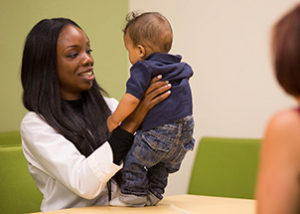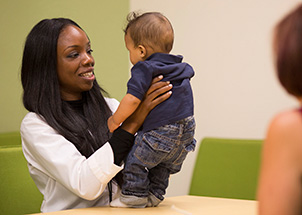
The Heinz Awards, created in memory of Pittsburgh native and late US Senator John Heinz (R-PA), bestowed this year’s award for the Human Condition to Dr. Nadine Burke Harris. Dr. Burke Harris, whose 2014 TedMed talk has been viewed over 2 million times, has tirelessly campaigned to raise awareness of toxic stress caused by Adverse Childhood Experiences, which greatly diminish long-term health and life expectancy. Burke Harris created the Center for Youth Wellness (CYW) in 2011, whose mission is to “improve the health of children and adolescents exposed to Adverse Childhood Experiences or ACES.” The Center’s website provides a relatable explanation of how toxic stress can hijack one’s normal and adaptive life-saving instinct:
Imagine that you see a bear while walking through a forest. In response to this threat, your body switches into “fight or flight” mode. To survive, your body releases emergency stress hormones, like adrenaline and cortisol, that cause your heartbeat to quicken, make your eyes dilate and focus your mind on the threat at hand—everything you need to get your body ready to run or to fight back. When activated occasionally, this system bypasses our thinking brain—the prefrontal cortex—and activates the primitive reactions that can get us out of the way of a mortal threat. In situations like this, stress is helpful—it keeps you alive.The problem comes when our system is overtaxed by repeated, intense or chronic stress. That cascade of chemicals and reactions goes from saving one’s life to damaging one’s health. Children are especially vulnerable to the harmful effects of chronic stress and trauma.
If these experiences go unnoticed and untreated, all levels of health–physical, emotional and mental–will be compromised. The ACES Too High website cites that children subjected to ACES (i.e., physical and/or sexual abuse, domestic violence, parental incarceration, divorce and substance abuse) and seeking relief are at an increased risk for substance abuse, suicide and maladaptive coping mechanisms such as overeating, sexual promiscuity and self-harming behaviors. Dr. Burke Harris’ Center for Youth Wellness employs interventions to address both parents and children in an attempt to mitigate the effects of and decrease the occurrence of ACES. After thorough health screenings, families in need are provided or referred for home visits, therapy, and education centering on health, well-being and mindfulness coping skills such as breathing exercises, progressive relaxation, meditation and mindfulness-based awareness.
Despite empirical evidence linking racial discrimination to adverse health outcomes, this particular stressor seems to be largely left out of the discussion of ACES. While the majority of ACES transcend racial lines, two recent studies highlight the importance of recognizing and addressing childhood stress caused by racial bias and prejudice. A recently published study conducted by Yale’s Child Study Center showed that implicit racial bias towards black boys–who are statistically the group most likely to be suspended or expelled–begins in pre-school and is perpetrated by both white and black teachers. Researchers used eye-tracking technology to document teachers who were asked to view classroom recordings and keep an eye out for potential misbehavior. Black boys received the most scrutiny from both black and white teachers compared to white boys and black and white girls. The researchers noted that black teachers seemed to have “stern–perhaps unrealistically stern–expectations of black preschooler’s behavior”, while white teachers harbored much lower expectations for their behavior.
Here in Pittsburgh, the “State of Girls” report released by the University of Pittsburgh School of Social Work and Gwen’s Girls, conceded that African American girls are suspended at 3 times the rate of white girls as well as being referred to the juvenile justice system at a rate of 11 times more than their white counterparts. Gwen’s Girls Executive Director Kathi Elliott shared with 90.5 WESA that while the clear evidence of high rates of bias was “surprising”, it also legitimizes the shared experiences of the girls impacted by such bias and necessitates the call for collaboration and intervention.
Shanna K Houser [email protected]



































